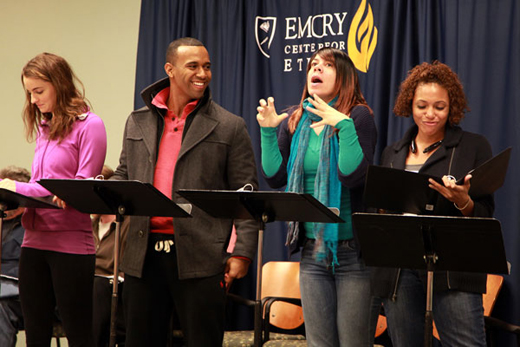The actors file into the room and line up in front of the audience. The playwright and director join them. There is no stage to separate actor from audience, so the dramatic reading that follows the introductions is intimate.
The playwright and director explain what everyone is about to see. After the actors' readings of the brief scenes, moderator Paul Wolpe, director of Emory's Center for Ethics, turns to the audience asking for their questions.
The questions come slowly at first, then build. The play, "Bike America," directed by Moritz von Stuelpnagel, won the 2013 Alliance National Graduate Playwriting Award for Michael Lew and will be performed on the Hertz Stage at Atlanta's Alliance Theatre Feb. 1-24.
But for tonight, the audience gathered at Emory's Center for Ethics, will get a glimpse behind the performance and be invited into a discussion on its larger meaning.
"In many cases, it's the only time audience members get a chance to actually sit down with the producer, director, writer and actors and not just watch but ask these types of questions," says Carlton Mackey, chair of the Ethics and the Arts Initiative at the center.
Audience participation is a hallmark of the center's Ethics on the Stage series, one of four components of its growing Ethics and the Arts Initiative. The center partners with the Alliance Theatre, the Atlanta Opera and the WonderRoot Community Arts Center to bring performers, producers and playwrights to campus to explore with audience members the ethical and social implications of productions.
"There is a sense of being unsettled in your 20s," explains "Bike America" playwright Pew after several scenes with the central character, Penny, a 20-something graduate student who ditches her clingy boyfriend and her life to go on a cross-country bike trip from Boston to Santa Barbara. Her interactions with a diverse group of fellow bikers on the trip are the focus of the work.
"I wanted to play with that uncertainty and also the people who judge those who are going through that," Lew explains. "Are these issues real or something we fabricate? It's real pain, but it's also self-indulgent. It's about how do you live through enormous uncertainty but still be responsible to others."
"What's interesting to me about this play is that it's almost entirely about character development," says Wolpe. "It's really remarkable how much you learn about social relationships, because usually character development is exclusively psychological. This play tells you something about economics, generations, sociology, geography, even while it's telling you something important about the characters."
At the end of the evening, the questions are still coming. Most people are finding little sympathy for protagonist Penny, who seems to be using people while remaining emotionally distant. One actor assures the audience that Penny will be held accountable for her actions. People have come to know the characters, and are still discussing the play as they leave.
"Art contains a set of issues that serve as a vehicle for dialogue," says Mackey, who also is a professional photographer and local filmmaker. "It challenges our perspectives. The Center for Ethics is committed to inspiring innovative thought by using creative expression, including theater, to prompt dialogue about ethical issues between students, artists, scholars and the public."
The series has brought playwrights such as Pearl Cleage, who recently placed her archive at Emory, and director Susan Booth to campus for readings from the Alliance's debut last fall of "What I Learned in Paris."
Next up is the Alliance's production of "The Whipping Man," March 8-April 7.
It's the story of Jewish Confederate soldier Caleb DeLeon, who returns from the Civil War to his Richmond, Virginia, home — and to his former slaves. Emory's Center for Ethics will host a reading and discussion with "Whipping Man" director Alexander Greenfield and playwright Matthew Lopez on Feb. 26.

